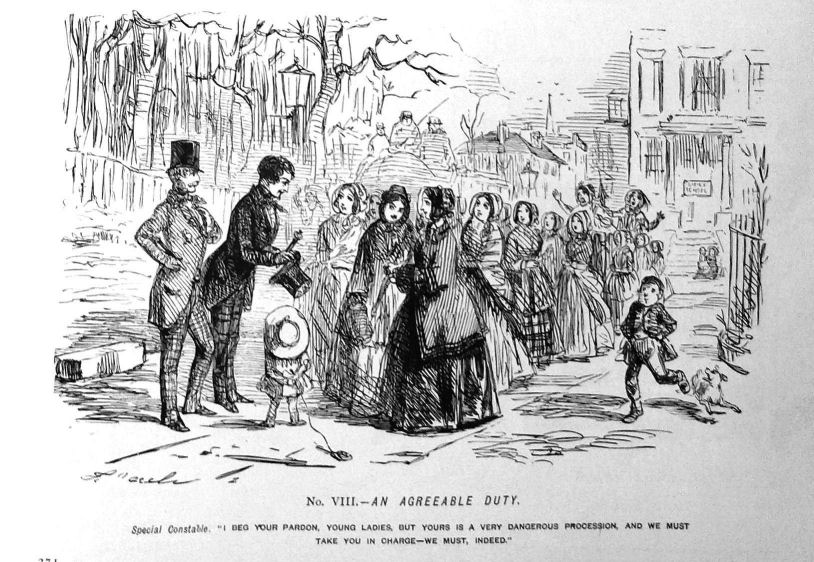Eliza Cook, a prominent figure in the chartist movement, advocated for educational rights and political freedom for the working men and women. Her poems uplifted the hearts of men by her understanding that England’s greatness is obtained from the ‘health and strength of labourers and not from the wealth of its landowners and industrialists.'[1] Her envision, alike many other chartists, saw the noble workingman as a figure of power in a new egalitarian society [2] that would allow all men to be in equal standing. For women, however, this was still a subject of controversy from the British nation.

Eliza wasn’t one to stand back on this controversy, her ‘levelling up’ way of thought allowed her publications to progress the political freedom for women. As a supporter of education for the working class- including girls- and self-improvement through education and political freedom, her views on this are recalled in her poems that were published for the Chartist movement.
Chartists poetry frequently emphasises the importance of education and stresses the centrality of the land and nature, both being an antidote for the corruption of city life and as a metaphor for the community, highlighting as well, the men who work on these lands and who make up this community.[5] The language Cook uses in her poems signify the mass, the community, the people who live and die for their land, these being the labourers and agriculturalists [6] they are unified and called ‘the people’ to exemplify togetherness and equality that the charter represents.
Therefore, poetry became an important platform for the Chartist movement, though, radicalised publications were also as important. Cooks own publications in the printing press came form her weekly periodical, Eliza Cook’s Journal, and at a penny, the working class person could afford to read and consume the weekly progressiveness of the movement, giving a sense of hope for their input to be recognised by the British government.
Some may also ask what else was the significance of her weekly periodicals, even though it increased popularity for Chartism, it also increased the chance of education and career opportunities for women which included working class women. [7] Other contemporaries before Cook such as Mary Wollstonecraft, was also an advocate for women’s education but has been since criticised for being centred exclusively on middling women. Being so, the Chartist movement was quite radical in the sense that it involved not only the working class men but also giving working class women the right to education and certain careers that could potentially lead to political freedom also.
[1] Robinson, Solveig C. 2001. “Of ‘Haymakers’ and ‘City Artisans’: The Chartist Poetics of Eliza Cook’s ‘Songs of Labour.’” Victorian Poetry 39 (2): Pg.234
[2] Ibid
[3] No. VIII- An Agreeable Duty, John Leech, Sketch from Punch, 1849, John Leech Archive Available at: http://www.john-leech-archive.org.uk/1849/great-chartist-demonstration-8.htm Accessed on 29/10/19
[4] H. Rogers, ‘From “Monster Meetings” to “Fire-side Virtues”? Radical women and “the People” in the 1840s’, Journal of Victorian Culture, 4, Pg.52
[5] Of ‘Haymakers’ and ‘City Artisans’: The Chartist Poetics of Eliza Cook’s ‘Songs of Labour, Pg.231
[6] Ibid, Pg.222
[7] Robinson, Solveig C. 2004 “Cook, Eliza (1812–1889), poet and journalist.” Oxford Dictionary of National Biography. http://www.oxforddnb.com/view/10.1093/ref:odnb/9780198614128.001.0001/odnb-9780198614128-e-6135. Accessed on 29/10/19
Featured Image: Eliza Cook, Unknown photographer, c.1860s, NPG Ax1896, National Portrait Gallery London. Available at: https://www.npg.org.uk/collections/search/portrait/mw156973/Eliza-Cook?LinkID=mp05191&search=sas&sText=eliza+cook&role=sit&rNo=1Accessed on 29/10/19
Bibliography-
H. Rogers, ‘From “Monster Meetings” to “Fire-side Virtues”? Radical women and “the People” in the 1840s’, Journal of Victorian Culture, 4
Robinson, Solveig C. 2001. “Of ‘Haymakers’ and ‘City Artisans’: The Chartist Poetics of Eliza Cook’s ‘Songs of Labour.’” Victorian Poetry 39 (2)
Robinson, Solveig C. 2004 “Cook, Eliza (1812–1889), poet and journalist.” Oxford Dictionary of National Biography.
The design of your blog is very good. I like how the text and images appear in the middle of the screen, which does not leave any empty gaps like your previous blog. I also like how you wrote out the caption in the image you used so that it is easier to read. While your topic is very interesting, you still write in an academic tone and not an informal blogging tone. Your general analysis of Cook’s poems is good, however you could choose one poem and focus on it to provide a more detailed and specific analysis. You could also add some information about what the Chartist movement is as some of your readers might not have prior knowlegde of it. Furthermore there are some grammar mistakes and missing punctuation in your blog. Overall I think this is a good blog with an interesting topic, which provides a lot of information to the reader.
LikeLike
I found this a well crafted and thoroughly readable piece of blogging. It offers a thoughtful assessment of how women like Eliza Cook envisaged new possibilities and opportunities for women which did not focus entirely on the achievement of the same rights as men (eg political enfranchisement).
I echo ‘HistoricalViews’ comments about grammar and punctuation. Closer proof reading is needed to check for these and for typos (‘form’ – instead of ‘from’); use of capital letters for titles, organisations etc. (Charter, Chartism); use of apostrophe to denote ownership – (Chartists’ poetry. Cook’s journal). And finally, a minor observation about word choice – “envision” is used early in the blog – it just doesn’t work!
Overall though this is a promising piece of blogging.
LikeLike